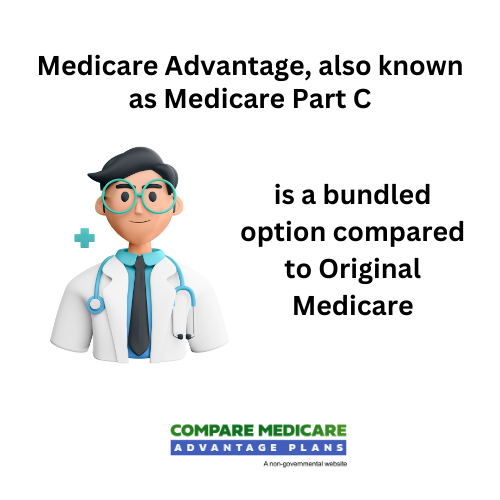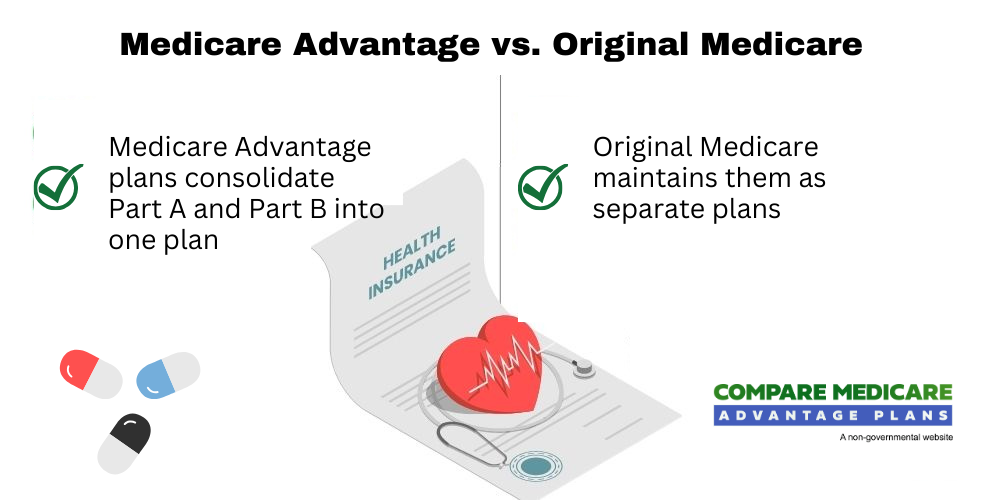Should I Get a Medicare Advantage Plan?
Navigating the world of healthcare might be complex, but understanding your options could be key to ensuring you receive the best care possible.
Some of the Medicare Advantage plans could be a popular choice for many, potentially offering convenience and comprehensive coverage under one plan.
This article will explore some of the potential details of Medicare Advantage plans, comparing them to Original Medicare, and discussing possible factors you may need to consider when making this decision.
Key Takeaways
- Evaluate the potential coverage, network restrictions, possible costs and extra benefits of certain Medicare Advantage plans to determine if they are the right fit for individual health needs.
- Weigh all-in-one convenience against any potential limitations on provider choice when considering a plan.
- Consider the potential premiums, out-of-pocket costs, and maximum limits when selecting a plan to ensure an informed decision with the best financial balance.
Compare Plans in One Step!
Enter Zip Code
Evaluating Medicare Advantage Plans: Are They Right for You?
A potential factor when choosing a healthcare plan is if it aligns with your individual needs and preferences. Some of the Medicare Advantage plans could offer an alternative to Original Medicare, combining hospital and medical insurance that may include additional benefits such as prescription drug coverage and dental care.
While these plans may provide the convenience of all-in-one coverage, weighing the potential pros and cons of the available Medicare Advantage plans, such as out-of-pocket costs and limitations in provider choice.

When considering Medicare Advantage plans, assessing the potential plan details is important. Here are some factors to consider:
- Coverage: Make sure the plan covers the services and medications you need.
- Network restrictions: Check if your preferred doctors and hospitals are in-network.
- Costs: Compare the potential premiums, deductibles, copayments, and out-of-pocket maximums.
- Extra benefits: Some plans may offer additional benefits like dental, vision, or hearing services.
You might find that a plan with a more extensive provider network or extra benefits could be better suited to your individual health needs. Members may want to compare the available Medicare Advantage plans in their area to find the one that offers the best combination of coverage, convenience, and affordability.
Understanding the Basics of Medicare Advantage
Medicare Advantage, also known as Part C, is a blend of Medicare Part A (hospital insurance) and Part B (medical insurance) coverage. What might set Medicare Advantage apart from Original Medicare may be the potential inclusion of additional benefits, such as:
- Prescription drug coverage
- Dental services
- Vision services

Some private insurance companies may offer plans that could be equivalent to the coverage you’d get from Original Medicare.
Some of these companies may even contract with Medicare to provide some of these plans.
While Medicare Advantage could be a cost-effective choice for those who are healthy and do not require frequent visits to a physician, understanding the plan’s structure is necessary and rules.
For instance, some plans may require referrals for specialist visits or have specific network restrictions that could limit your choice of healthcare providers.
Understanding these potential nuances could help you decide whether a Medicare Advantage plan is right for you.
Personal Health Needs and Potential Plan Benefits
Your personal health needs could be a significant influence in determining the most suitable Medicare Advantage plan for you. Individuals with chronic conditions or specific healthcare requirements may find it beneficial to choose a plan that could offer specialized services or providers that may address their individual needs.
For instance, certain types of Medicare Advantage plans, such as Medicare Special Needs Plans (SNPs) and Chronic Condition Special Needs Plans (C-SNPs), may be designed to provide specialized care and support for those with specific severe or disabling chronic conditions.
Besides the coverage of medically necessary services, some of the Medicare Advantage plans may also offer benefits not provided by Original Medicare, such as vision, hearing, and dental coverage. When comparing the potential plans, considering the possible benefits will likely be important about your personal health needs and preferences.
For example, if you require ongoing prescription medication, you’ll likely want to ensure that the plan’s formulary and Medicare drug coverage for prescription drugs meets your needs at a reasonable cost.
All-in-One Convenience vs. Provider Flexibility
One of the potential appeals of some Medicare Advantage plans could be the all-in-one convenience they might offer. By combining medical, hospital, and prescription drug needs under one plan, beneficiaries may be able to enjoy a more streamlined healthcare experience.
When choosing a Medicare Advantage plan, weigh the convenience necessary of having all your coverage in one plan against the potential limitations in provider choice. You may find that some of the additional benefits and possible cost savings in certain Medicare Advantage plans could outweigh any restrictions on provider networks.
However, if provider flexibility and the freedom to choose any doctor or hospital that accepts Medicare is more important to you, Original Medicare may be a better fit.
Possible Financial Implications of Choosing Medicare Advantage
Financial factors could significantly influence choosing a Medicare Advantage plan. You’ll likely need to consider the potential premiums, out-of-pocket costs, and potential savings when comparing plans.
While Medicare Advantage plans may offer lower premiums and out-of-pocket costs than Original Medicare, weighing these potential cost savings is important against any additional expenses you may incur, such as copays and deductibles.

When evaluating the potential financial implications of choosing a Medicare Advantage plan, considering the maximum out-of-pocket limits may also be crucial, which could provide a safety net in case of significant medical expenses.
By carefully comparing the potential costs and coverage of different Medicare Advantage plans, you can make an informed decision about which plan offers the best balance of affordability and comprehensive coverage for your needs.
Possible Premiums and Out-of-Pocket Costs
Some of the potential premiums for Medicare Advantage plans may include the monthly payments you make to your plan, while out-of-pocket costs may include expenses you pay for services not covered by your plan, such as copays and deductibles.
Comparing the potential premiums and out-of-pocket costs of different Medicare Advantage plans is important to determine which one is the most affordable for you.
Other factors such as health status, healthcare utilization, and the specific services you might need could also impact the overall cost of your plan. Make sure to consider these potential costs alongside any potential cost savings, such as lower monthly premiums or reduced cost-sharing, to make an informed decision about which plan best suits your financial needs.
Weighing Cost Savings Against Potential Expenses
While some Medicare Advantage plans may offer cost savings compared to Original Medicare, it may be necessary to weigh these potential benefits against any potential expenses that may arise from choosing a plan.
For example, copays and deductibles may vary depending on the insurer and location, and some services may not be covered under certain plans, which could result in additional out-of-pocket expenses.
To evaluate the true value of a Medicare Advantage plan, consider both the potential cost savings may be crucial and any expenses that may not be included in the plan. This may involve comparing the costs of providing benefits to enrollees in Medicare Advantage plans to those of Original Medicare.
By carefully considering the costs and benefits of different plans, you can identify the option that is most cost-effective for your specific needs and potentially avoid any unexpected expenses.
Comparing Medicare Advantage to Traditional Medicare
To make an informed decision about whether Medicare Advantage is the right choice for you, it may be necessary to compare the potential coverage, provider networks, and financial implications of these plans to those of Original Medicare.
While some Medicare Advantage plans might offer additional benefits not provided by Original Medicare, such as dental, vision, and hearing coverage, they may also have more limited provider networks and might require referrals for specialist visits.

When deciding between federal insurance (Original Medicare) and private insurance (Medicare Advantage), you might want to consider factors such as:
- Costs
- Coverage
- Provider network
- Prescription drug coverage
By thoroughly comparing the potential advantages and disadvantages of each option, you can determine which type of insurance best aligns with your healthcare needs, preferences, and financial situation.
Coverage Original Medicare vs. Medicare Advantage
Original Medicare, encompassing Medicare Part A and Part B, will likely cover a wide range of services, such as inpatient hospital care, skilled nursing facility care, hospice care, laboratory tests, surgery, home healthcare, doctor visits, outpatient services, and certain preventative care.

However, Medicare Advantage plans could provide more benefits than Original Medicare. Some plans may include additional benefits such as dental, vision, and hearing services, as well as prescription drug coverage.
When comparing the coverage offered by Original Medicare and Medicare Advantage plans, you may want to consider the additional benefits and services. For instance, if you require ongoing dental, vision, or hearing care, a Medicare Advantage plan may offer more comprehensive coverage than Original Medicare.
However, if you prefer the flexibility to choose any doctor or hospital that accepts Medicare, Original Medicare may be the better option.
Choosing Between Federal and Private Insurance
The decision between federal insurance, such as Original Medicare, and private insurance, like Medicare Advantage plans, is a personal one that depends on your needs and preferences.

While Original Medicare is managed by the federal government and provides standardized coverage and regulations that could ensure the quality of care, Medicare Advantage plans are offered by private insurers and may also provide additional benefits and services not covered by Original Medicare.
When deciding between federal and private insurance, you might want to consider factors such as:
- Coverage
- Network
- Costs
- Flexibility
You may find that the convenience and additional benefits that could be offered by a Medicare Advantage plan may outweigh any network limitations, or you may prefer the broader coverage and provider flexibility provided by Original Medicare.
By carefully considering these factors, you may choose the insurance option that best aligns with your healthcare needs and preferences.
Navigating Networks and Providers with Medicare Advantage
To navigate networks and providers with Medicare Advantage, you’ll likely need to understand the plan’s potential network limitations and the process of seeking care from specialists.
While some Medicare Advantage plans may offer the convenience of all-in-one coverage, they may also have more limited provider networks compared to Original Medicare, which could impact your access to care and your ability to see certain healthcare providers.
In addition to understanding the potential limitations of a plan’s network, being aware of referral requirements and prior authorization processes when seeking care from specialists is also important.
By being aware of these factors, you could make an informed decision about whether a Medicare Advantage plan is the right choice for you based on your healthcare needs and preferences for provider flexibility.
Importance of Plan’s Network
The plan’s network could have a significant impact in determining the availability of healthcare providers and specialists within a Medicare Advantage plan.
The network is made up of doctors, hospitals, and other healthcare providers that have agreed to provide services to plan members at predetermined rates. A wider network could mean more healthcare providers may be available for selection, whereas a more restricted network may limit the number of providers available.

When choosing a Medicare Advantage plan, you might want to consider the plan’s network and how it may impact your access to care. Access to out-of-network providers may incur substantial costs, except in cases of emergency.
In comparison to traditional Medicare, some Medicare Advantage plans may tend to have more restricted provider networks, which could potentially affect your ability to see certain healthcare providers and specialists.
Seeking Care from Specialists
Under a Medicare Advantage plan:
- Referral requirements and prior authorization processes may apply when seeking care from specialists.
- In most cases, a referral from a primary care physician may not be necessary to obtain care from specialists, and you could directly seek care from specialists without requiring a referral.
- However, it’s wise to consult your specific plan to understand any particular requirements or guidelines for obtaining care from specialists.
When you compare Medicare Advantage plans, consider how the plan’s network and referral requirements may impact your access to specialist care. If you have ongoing health needs that require the expertise of a specialist, you might want to ensure that the plan’s network and referral process align with your healthcare needs and preferences.
By being aware of these factors, you can make an informed decision about whether a Medicare Advantage plan is the right choice for you.
Transitioning to a Medicare Advantage Plan
To transition to a Medicare Advantage plan, you need to understand the enrollment process, consider the timing, and be aware of potential challenges when switching plans.
Enrollment in a Medicare Advantage plan can be achieved by calling 1-833-641-4938 (TTY 711), Mon-Fri 8 am-9 pm EST. However, being aware of the specific enrollment periods is essential for transitioning to a Medicare Advantage plan, as these periods may be limited.
If you’re thinking about switching from Original Medicare to a Medicare Advantage plan, keep in mind that you may face potential challenges, such as limited enrollment periods and potential difficulties in obtaining a Medicare Supplement Insurance (Medigap) policy afterward.
By understanding the enrollment process and carefully considering the timing of your transition, you can make a seamless switch to a Medicare Advantage plan that meets your healthcare needs and preferences.
How to Enroll in a Medicare Advantage Plan
You may enroll in a plan by calling one of our licensed agents at 1-833-641-4938 (TTY 711), Mon-Fri 8 am-9 pm EST. They can provide comprehensive information, personalized guidance, and ongoing assistance to navigate the enrollment process for private insurance companies, making it easier for beneficiaries to make informed decisions about their healthcare.
 Be prepared to provide the following information when enrolling in a Medicare Advantage plan:
Be prepared to provide the following information when enrolling in a Medicare Advantage plan:
- Social Security number
- Date and place of birth
- Citizenship status
- Proof of U.S. citizenship or legal residency
Switch Medicare Advantage Plans: Considerations and Timing
Switching Medicare Advantage plans can be a complex process, as it involves considering the timing of your transition and any potential challenges that may arise.
One of the main challenges is the limited enrollment periods for transitioning to a new Medicare Advantage plan. You may switch plans during the Annual Election and Open Enrollment Period, which runs from October 15th to December 7th each year, or during the Medicare Advantage Open Enrollment Period from January 1st to March 31st.
When switching Medicare Advantage plans, considering any potential difficulties is also important in obtaining a Medigap policy after your transition.
Insurers may decline to issue a Medigap policy if there are health issues present, or they may require a waiting period before covering pre-existing conditions. By being aware of these factors and carefully planning your transition, you can ensure a smooth experience when switching Medicare Advantage plans.
Potential Benefits and Extra Services
Supplemental benefits and extra services that might be offered by certain Medicare Advantage plans could potentially enhance your healthcare experience. However, evaluating their worth based on your individual needs and preferences is vital. Some Medicare Advantage plans may provide the following additional benefits:
- Dental coverage
- Vision coverage
- Hearing coverage
Evaluating the value of supplemental benefits and extra services could help you make a more informed decision about whether a Medicare Advantage plan suits you. You may also want to consider factors such as the specific benefits provided, the potential cost of the benefits, and the impact on your healthcare needs and preferences.
By carefully weighing these factors, you may choose a plan that could offer the supplemental benefits and extra services that best align with your healthcare needs and preferences.
Beyond Basic Coverage
Certain Medicare Advantage plans, also known as health maintenance organizations, may also offer a range of added perks that could enhance your healthcare experience, such as:
- Dental coverage
- Vision coverage
- Hearing coverage
Some of these extra benefits could provide a more comprehensive healthcare package for Medicare beneficiaries, which might address a wide range of health and social needs not covered by Original Medicare.
When evaluating the added perks of a Medicare Advantage plan, consider how these potential benefits could align with your personal health needs and preferences.

For example, if you require ongoing dental care, a plan with comprehensive dental coverage may be more beneficial to you than one without it. By carefully examining the additional benefits and services provided by different Medicare Advantage plans, you could choose the one that best meets your healthcare requirements and preferences.
Evaluating the Value of Supplemental Benefits
To assess the value of supplemental benefits in a Medicare Advantage plan, you should consider potential factors such as the specific benefits provided, the cost of the benefits, and their impact on your healthcare needs and preferences.
Evaluating the value of supplemental benefits about your personal health needs and preferences could help you make a more informed decision about whether a Medicare Advantage plan suits you.
You should consider the availability and accessibility of the benefits, as well as any potential changes or updates to the benefits when making your decision.
Ultimately, the value of supplemental benefits will likely depend on your individual healthcare needs and preferences, thus choosing a plan that best aligns with your unique requirements is important.
Summary
Some of the Medicare Advantage plans could offer an alternative to Original Medicare, combining hospital and medical insurance as well as additional benefits such as prescription drug coverage, dental care, and vision services.
While these plans could provide all-in-one convenience, it’s essential to weigh the pros and cons of Medicare Advantage, including potential out-of-pocket costs, possible limitations in provider choice, and the financial implications of choosing a plan.
By carefully evaluating the coverage, provider networks, and supplemental benefits that could be offered by different Medicare Advantage plans, you can make an informed decision about whether a Medicare Advantage plan is the right choice for you, based on your healthcare needs and preferences.
Frequently Asked Questions
→ What is the biggest advantage of Medicare Advantage?
Some of the Medicare Advantage plans may offer several advantages, such as a broad range of doctor choices, reduced out-of-pocket costs, and extensive coverage for certain services.
→ Is it worth switching to a Medicare Advantage plan?
Considering the potential benefits and lower out-of-pocket maximums, switching to a Medicare Advantage plan could be beneficial. However, it is important to note that you cannot have both a Medicare Supplement and a Medicare Advantage plan.
→ Why are people choosing Medicare Advantage plans?
People might choose a Medicare Advantage plan due to the lack of prior authorization denial rates and quick payments from insurers.
→ How do I know if a Medicare Advantage plan is right for me?
Evaluating your medical needs, coverage desired, provider availability, and budget could help you decide if Medicare Advantage is the right choice for you.
→ Can I switch back to Original Medicare after enrolling in a Medicare Advantage plan?
Yes, you can switch back to Original Medicare during certain enrollment periods. However, it may be more difficult to obtain a Medicare Supplement Insurance policy afterward.

ZRN Health & Financial Services, LLC, a Texas limited liability company
Russell Noga is the CEO of ZRN Health & Financial Services, and head content editor of several Medicare insurance online publications. He has over 15 years of experience as a licensed Medicare insurance broker helping Medicare beneficiaries learn about Medicare, Medicare Advantage Plans, Medigap insurance, and Medicare Part D prescription drug plans.



